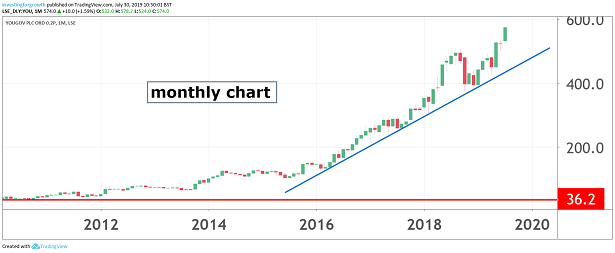Stockwatch: This share is a class act and keeps on rising
With attractive fundamentals, this AIM firm remains a quality momentum play in the Brexit environment.
30th July 2019 11:12
by Edmond Jackson from interactive investor
With attractive fundamentals, this AIM firm remains a quality momentum play in the Brexit environment.

A bullish update from AIM-listed YouGov (LSE:YOU) has affirmed my 'buy' stance last April at 450p. Trading for its year to end-July "comfortably" ahead of expectations with revenue "substantially" ahead of the global market research sector!
So, with the YouGov share price up 28% to around 570p, and trading on a price/earnings (PE) multiple of 34 times last adjusted annual earnings per share (EPS), or 73 times statutory EPS, is it now better to take profits on the high-profile pollster?
Its earnings contrast between adjusted and statutory is due to capitalising various operating expenses as intangibles, which, yes, is a concern as the company continues global expansion. It's the sort of thing that's within accounting rules but can raise eyebrows.
Right now, YouGov is riding high as the market prizes what few companies show they can thrive in a weakening environment. But, with a miniscule dividend, YouGov's narrative has got to remain strong otherwise the stock could attract short sellers mouthing criticism.

Source: TradingView Past performance is not a guide to future performance
Distinguishing factors from other AIM stocks
By way of comparison, AIM-listed insolvency advisor Begbies Traynor (LSE:BEG), which I've also favoured, has soared to 87p (currently 77p), which represents 16 times normalised earnings or 35 times statutory, on a yield of 3.3%.
It's benefiting from a tougher financial environment tipping indebted businesses over the edge, which may be early days if the realities of a hard Brexit prove stark.
But it's a UK-oriented business, so in the event of economic upturn its stock will likely sell off, whereas YouGov's attraction is being a market leader with global reach, the US and UK the main profit drivers and with their politics intensifying.
US dollar exposure is also a comfort should sterling remain weak. Its current financial year to end-July is an overlap year between five-year plans.
The aim to 2023 is to double group revenue and adjusted operating profit margin with an adjusted EPS compound growth rate over 30%. So, for the period potentially to include "the Brexit years", it may still be early days for YouGov to distinguish itself. A premium rating is justified but the accounting lends scope to bicker as to what's appropriate.
Another (if more indirect) AIM comparison is Burford Capital (LSE:BUR) in litigation finance, whose success has attracted questions over its accounting for cash returns, which has disturbed the stock's remarkable bullish trend into volatile sideways consolidation. Major shareholder Neil Woodford's troubles do Burford no favours.
It's now fallen from over 2,000p after both 2018 prelim and 2019 interim results looked very strong to around 1,400p currently, with recent buyers despairing to blame the volatility on the AIM listing.
Yes, it's possible AIM does result in more valuation extremes, and in no way am I drawing a parallel with YouGov's cash returns. But when the most successful businesses are usually difficult to value anyway, scope for different accounting views just makes it trickier. Such stocks tend to do very well until sentiment breaks down; resuming confidence can then be a challenge.
Despite these caveats, YouGov's fundamentals are looking most attractive.
Affirming the sense of a global market leader
"Notably revenue has continued to progress substantially ahead of the global market research sector" which flags YouGov as a takeover target for international marketing services firms – e.g. in the short to medium term, looking for means of less cyclical earnings, and longer-term an intrinsic (if speculative) prop should sentiment break down like at Burford.
"Data Products & Services continued its rate of excellent growth, and remains a strong contributor to profit, while Custom Research achieved growth rates above the industry average," we're told.
This follows April's interims to 31 January that quantified revenue growth of 18% albeit 10% if excluding acquisitions and currency translation.
Adjusted operating profit soared 41% though on an underlying basis was still an impressive 35%. Net cash – some would say if confirmation of a growth company - rose 21% to £25 million.
- An AIM share to buy on the dips
- Like AIM and small-company shares? Check out ii's Super 60 recommended funds
So, this latest update builds on the April results and, unsurprisingly, there's no disclosed shorting in YouGov.
I'll repeat my concern regarding virtually all listed businesses selling into Continental Europe: they don't make it clear what extent they could be affected by a no-deal Brexit, or how they have been preparing. The assumption appears to be, they have established subsidiaries there, which circumvents tariff and/or regulatory risk. Time will tell.
Mainland Europe only represented 5.6% of YouGov's interim operating profit (before central costs), although it was the second fastest growing in this respect, up 147% versus 653% for Asia Pacific (albeit from an even smaller base). Overall, I don't see enough of a setback in Continental Europe emerging, versus medium-term opportunities in the UK and US – 86% of operating profit – as potentially both face major elections.
Operating margins are lower in Europe and Asia Pacific at 19% and 6% respectively, versus 34% for both the UK and US and the Middle East enjoying 38%, although this may follow from a smaller scale yet to establish economies.
| YouGov - financial summary | ||||||
|---|---|---|---|---|---|---|
| year ended 31 Jul | 2013 | 2014 | 2015 | 2016 | 2017 | 2018 |
| Turnover (£ million) | 62.6 | 67.4 | 76.1 | 88.2 | 107 | 117 |
| IFRS3 pre-tax profit (£m) | 1.5 | 0.7 | 2.7 | 5.5 | 7.9 | 11.8 |
| Operating margin (%) | 4.6 | 4.8 | 5.0 | 7.6 | 7.8 | 10.1 |
| IFRS3 earnings/share (p) | 2.0 | 0.4 | 3.1 | 3.2 | 4.4 | 7.7 |
| Earnings per share growth (%) | 120 | -14.2 | 49.8 | 3.1 | 37.5 | 75.0 |
| Price/earnings multiple (x) | 74.0 | |||||
| Cash flow/share (p) | 6.8 | 8.8 | 9.5 | 11.4 | 15.6 | 21.0 |
| Capex/share (p) | 4.2 | 5.9 | 5.7 | 5.9 | 7.4 | 7.8 |
| Dividend per share (p) | 0.5 | 0.6 | 0.8 | 1.0 | 2.0 | 3.0 |
| Covered by earnings (x) | 7.0 | 5.0 | 5.4 | 4.4 | 2.2 | 2.6 |
| Net tangible assets per share (p) | 13.4 | 11.4 | 15.0 | 20.1 | 24.2 | 23.7 |
| Source: Company REFS |
For now, a prime momentum stock
It's hard to see what could materially disrupt YouGov's performance in a stock market that continues to polarise between what few businesses are able to grow in a Brexit environment (including overseas interests) and those chiefly domestic-oriented.
In principle, those on low PE ratios and high dividend yields may well be pricing in an extent of recession – to offer a better risk profile than the likes of YouGov on an admittedly lofty rating.
But I suspect investors will await proof of what the autumn brings, by way of Halloween Brexit or further political chaos and its aftermath. If companies start to warn, then a low PE can go plenty further down – witness decimated motor retailing and retail property stocks already.
Another positive is YouGov holding little fascination among traders, whereas Burford's stellar rise and brokers' touting fancy targets, appeared to attract unstable hot money into the stock.
YouGov appears broadly to be treated as a tuck-away - in the late 2018 bear market it fell a relatively modest 20% to about 400p compared to other small caps. At around 570p, it's capitalised at £600 million.
Two examples of modest selling by insiders
I should note several directors have sold into this year's rally and none have added. On 17 June, the chief operating officer sold 25,000 shares at 500p retaining 311,008, and back in February the chief innovation officer sold 22,500 at 459p – the announcement omitting any detail as to ongoing holding (whether or not mandatory disclosure for a senior manager than director).
I am inclined to see these trades as enjoying some fruits of success than providing a verdict on value. Key directors would also have had shares from YouGov's founder years since 2000, listing in 2005.
By way of growth stock comparison, I recall directors of ARM Holdings cashing in far more substantially during its rise, which ultimately resulted in a takeover at a premium.
My natural caution regarding valuation inclines me to a 'hold' stance given that the PE multiples YouGov enjoys today can't last forever. But the stock's blipping about on the rise – currently 570p as I write – shows it is attuned to the current environment both on fundamentals and sentiment. So, I continue to suggest, for experienced traders now: Buy.
Edmond Jackson is a freelance contributor and not a direct employee of interactive investor.
These articles are provided for information purposes only. Occasionally, an opinion about whether to buy or sell a specific investment may be provided by third parties. The content is not intended to be a personal recommendation to buy or sell any financial instrument or product, or to adopt any investment strategy as it is not provided based on an assessment of your investing knowledge and experience, your financial situation or your investment objectives. The value of your investments, and the income derived from them, may go down as well as up. You may not get back all the money that you invest. The investments referred to in this article may not be suitable for all investors, and if in doubt, an investor should seek advice from a qualified investment adviser.
Full performance can be found on the company or index summary page on the interactive investor website. Simply click on the company's or index name highlighted in the article.
Disclosure
We use a combination of fundamental and technical analysis in forming our view as to the valuation and prospects of an investment. Where relevant we have set out those particular matters we think are important in the above article, but further detail can be found here.
Please note that our article on this investment should not be considered to be a regular publication.
Details of all recommendations issued by ii during the previous 12-month period can be found here.
ii adheres to a strict code of conduct. Contributors may hold shares or have other interests in companies included in these portfolios, which could create a conflict of interests. Contributors intending to write about any financial instruments in which they have an interest are required to disclose such interest to ii and in the article itself. ii will at all times consider whether such interest impairs the objectivity of the recommendation.
In addition, individuals involved in the production of investment articles are subject to a personal account dealing restriction, which prevents them from placing a transaction in the specified instrument(s) for a period before and for five working days after such publication. This is to avoid personal interests conflicting with the interests of the recipients of those investment articles.